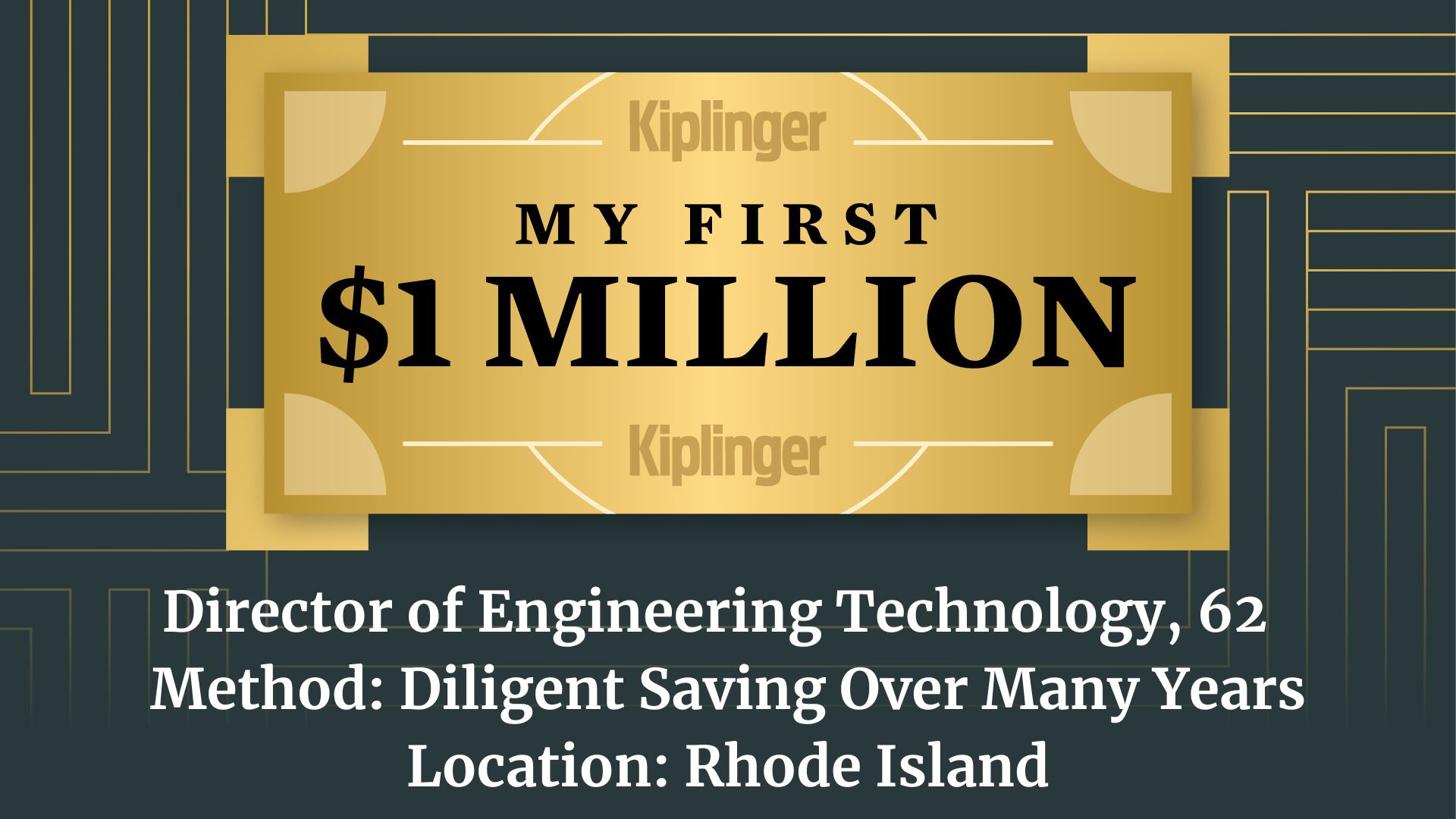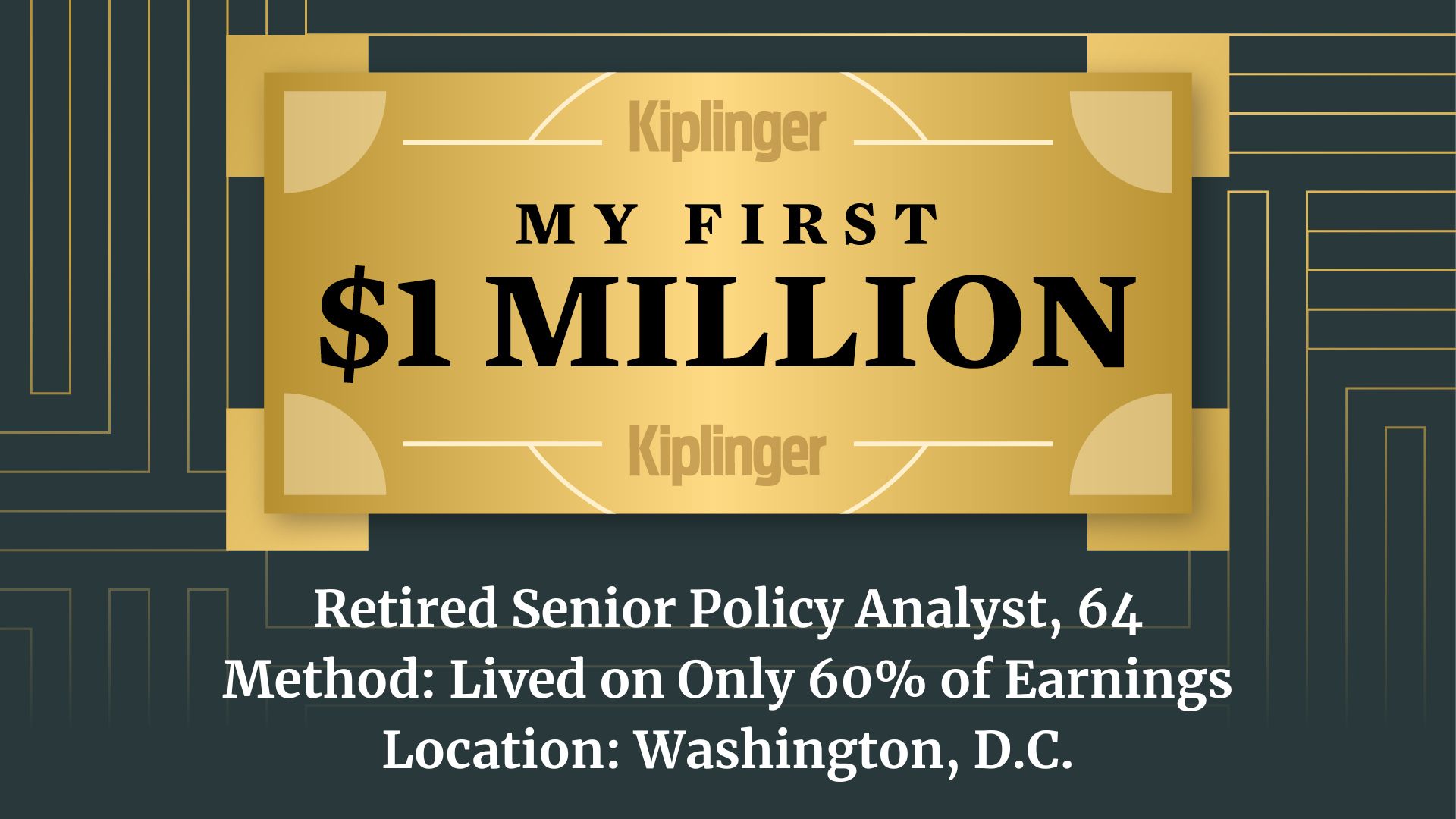My First $1 Million: Director of Engineering Technology, 62, Rhode Island
"Let your financial adviser know they have competition. I drop the underperforming one every three to five years."


Profit and prosper with the best of Kiplinger's advice on investing, taxes, retirement, personal finance and much more. Delivered daily. Enter your email in the box and click Sign Me Up.
You are now subscribed
Your newsletter sign-up was successful
Want to add more newsletters?
Welcome to Kiplinger's My First $1 Million series, in which we hear from people who have made $1 million. They're sharing how they did it and what they're doing with it. This time, we hear from a married Rhode Island-based 62-year-old director of engineering technology in the medical devices industry.
See our earlier profiles, including a writer in New England, a literacy interventionist in Colorado, a semiretired entrepreneur in Nashville and an events industry CEO in Northern New Jersey. (You can check out all of the profiles here.)
Each profile features one person or couple, who will always be completely anonymous to readers, answering questions to help our readers learn from their experience.
From just $107.88 $24.99 for Kiplinger Personal Finance
Become a smarter, better informed investor. Subscribe from just $107.88 $24.99, plus get up to 4 Special Issues

Sign up for Kiplinger’s Free Newsletters
Profit and prosper with the best of expert advice on investing, taxes, retirement, personal finance and more - straight to your e-mail.
Profit and prosper with the best of expert advice - straight to your e-mail.
These features are intended to provide a window into how different people build their savings — they're not intended to provide financial advice.
THE BASICS
How did you make your first $1 million?
I was a diligent saver based on early advice from an older engineer.
Time is your second-best friend — saving is your first when it comes to making your first million.

As you age, it reverses. Time becomes the most valuable commodity that you can't increase, and money matters less.
Additionally, I did real estate flipping (1985-1990) before it was a thing.
What are you doing with the money?
I continued to invest and learned everything I could about it. I didn't even celebrate (the million-dollar mark). It was made from a combination of real estate investments, multifamilies and 401(k) investments.
My next million included stock options as well.
After hitting $1 million, I set my focus on the next million.
THE FUN STUFF
Did you do anything to celebrate?
Nope.
What is the best part of making $1 million?
The fun of seeing the number grow faster as it gets larger, learning so much about investing and taxes and helping others. I am the go-to guy in my circles.

My accountant said, "You don't need me. You know more than any client I have about taxes and investing."
Did your life change?
Not really. Hitting $3 million made me less worried about employment.
Any plans to retire early?
Nope. I love what I do, I have plenty of flexibility, and I'm going to leave my kids a legacy.
I'm educating them on investing now. One is presently in financial services, based on my getting them investing at age 15 and (showing them) continued articles (about financial topics) and (having) dinner discussions.
LOOKING BACK
Anything you would do differently?
Definitely. I listened to someone about private equity investing, but they had no experience in it. I lost $500,000 of the $900,000 I invested.
I thought I was derisking my stock market investments by being in private equity real estate. Worst mistake of my financial life.
In that five-year period, the same money properly invested would have grown to $1.5 million.

Two lessons:
- Do more diligence. The margin for error was slim. The possibility of losing everything was higher than expected. I thought being in five different private equity deals was enough diversification.
- Never — I repeat, never — get into an investment where you lose control and can't sell to get your money back whenever you want.
I saw these deals going south early on when others did not, but I could not get out of the investment, as you can in the stock market or if you own real estate.
Did you work with a financial adviser?
I was and am an avid believer in working with a financial adviser, but listen but verify. Educate yourself. There are too many people in it for the wrong reasons.
I did most of my 40 years of investing without an adviser. I started with one at around $1.5 million. Added a second adviser shortly after.
(You should) let (your adviser) know they have competition. I drop the underperforming one every three to five years.

Also, I let them know their job is to beat the index in up years and protect my money in down years. If they can't do that, tell them you should just be in a low-cost ETF that mimics an index of choice. Be transparent and firm. I use Fidelity Investments. I have used Morgan Stanley in the past.
Did anyone help you early on?
My father got me investing at 15 years old.
LOOKING AHEAD
Plans for your next $1 million?
Travel and help kids with buying homes.
Any advice for others trying to make their first $1 million?
Have a detailed plan. I had and still have a detailed spreadsheet of my investments and multiple projections of savings and returns that got me to $1 million, $2 million and $3 million (and will get me to) $8 million.
I tracked and updated it biannually for 30 years. I am 62 and at $4 million. Plan on being at $8 million by 70-75 years old, depending on investment returns and when I retire (and start taking withdrawals).
Do you have an estate plan?
In the process of creating our plan now.
What are you glad you know before you retire?
You can't put a value on time.
What do you wish you'd known …
When you first started saving? Easy one: Sacrifice and invest the most early.

When you first started investing? Don't buy anything without first doing proper diligence. Define what that is. Always wait and think deeper. Include the what-if scenarios.
When you first started working with a financial professional? It's OK to give them quantitative goals and let them know you are measuring their performance against the market and low-cost ETFs.
If you have made $1 million or more and would like to be anonymously featured in a future My First $1 Million profile, please fill out and submit this Google Form or send an email to MyFirstMillion@futurenet.com to receive the questions. We welcome all stories that add up to $1 million or more in your accounts, although we will use discretion in which stories we choose to publish, to ensure we share a diversity of experiences. We also might want to verify that you really do have $1 million. Your answers may be edited for clarity.
RELATED CONTENT
- You're 62 Years Old With $1 Million Saved: Can You Retire?
- Want to Earn $1 Million More Over Your Lifetime? Do This
- Do You Have at Least $1 Million in Tax-Deferred Investments?
- Are You Rich? U.S. Net Worth Percentiles Can Provide Answers
- Compare Your Net Worth by Age
Profit and prosper with the best of Kiplinger's advice on investing, taxes, retirement, personal finance and much more. Delivered daily. Enter your email in the box and click Sign Me Up.

As Contributed Content Editor for the Adviser Intel channel on Kiplinger.com, Joyce edits articles from hundreds of financial experts about retirement planning strategies, including estate planning, taxes, personal finance, investing, charitable giving and more. She has more than 30 years of editing experience in business and features news, including 15 years in the Money section at USA Today.
-
 Thinking of Switching Phone Carriers? Do These 8 Things First
Thinking of Switching Phone Carriers? Do These 8 Things FirstSwitching carriers is easier than ever, but overlooking the fine print could cost you. Here’s what to check before you make the move.
-
 Samsung Galaxy S26 Ultra: What to Know Before You Upgrade
Samsung Galaxy S26 Ultra: What to Know Before You UpgradeThe Galaxy S26 Ultra brings new features and strong launch deals, but whether it’s worth upgrading depends on what you already own.
-
 Nasdaq Soars Ahead of Nvidia Earnings: Stock Market Today
Nasdaq Soars Ahead of Nvidia Earnings: Stock Market TodayWednesday's risk-on session was sparked by strong gains in tech stocks and several crypto-related names.
-
 What Is an Assumable Mortgage and Could It Save You Thousands?
What Is an Assumable Mortgage and Could It Save You Thousands?With mortgage rates still elevated, taking over a seller’s existing home loan could lower monthly payments — if the numbers work.
-
 Have You Fallen Into the High-Earning Trap? This Is How to Escape
Have You Fallen Into the High-Earning Trap? This Is How to EscapeHigh income is a gift, but it can pull you into higher spending, undisciplined investing and overreliance on future earnings. These actionable steps will help you escape the trap.
-
 I'm a Financial Adviser: These 3 Questions Can Help You Navigate a Noisy Year With Financial Clarity
I'm a Financial Adviser: These 3 Questions Can Help You Navigate a Noisy Year With Financial ClarityThe key is to resist focusing only on the markets. Instead, when making financial decisions, think about your values and what matters the most to you.
-
 Where Olympians Store Their Medals is a Great Lesson For Your Valuables and Cash
Where Olympians Store Their Medals is a Great Lesson For Your Valuables and CashWhat you can learn about protecting your cash and values from where Olympians store their medals.
-
 An Executive's 'Idiotic' Idea: Skip Safety Class and Commit a Federal Crime
An Executive's 'Idiotic' Idea: Skip Safety Class and Commit a Federal CrimeSeveral medical professionals reached out to say that one of their bosses suggested committing a crime to fulfill OSHA requirements. What's an employee to do?
-
 How You Can Use the Financial Resource Built Into Your Home to Help With Your Long-Term Goals
How You Can Use the Financial Resource Built Into Your Home to Help With Your Long-Term GoalsHomeowners are increasingly using their home equity, through products like HELOCs and home equity loans, as a financial resource for managing debt, funding renovations and more.
-
 How to Find Free Money for Graduate School as Federal Loans Tighten in 2026
How to Find Free Money for Graduate School as Federal Loans Tighten in 2026Starting July 1, federal borrowing will be capped for new graduate students, making scholarships and other forms of "free money" vital. Here's what to know.
-
 My First $1 Million: Retired Senior Policy Analyst, 64, Washington, D.C.
My First $1 Million: Retired Senior Policy Analyst, 64, Washington, D.C.Ever wonder how someone who's made a million dollars or more did it? Kiplinger's My First $1 Million series uncovers the answers.